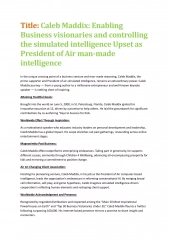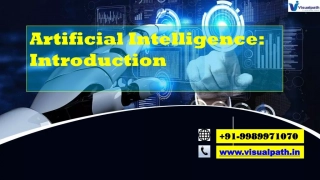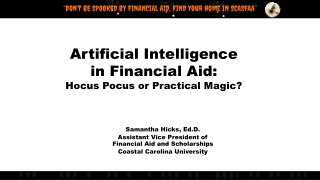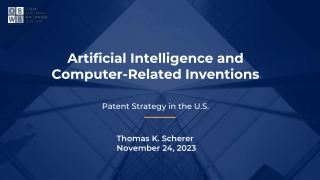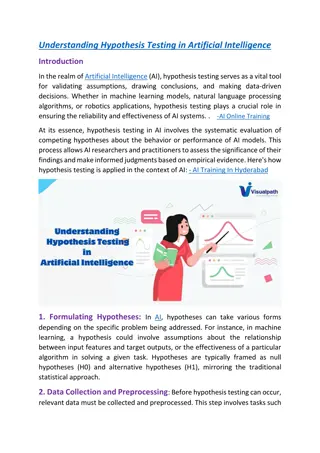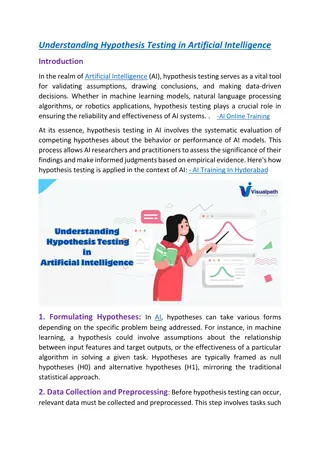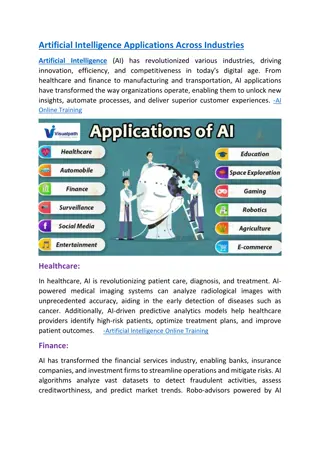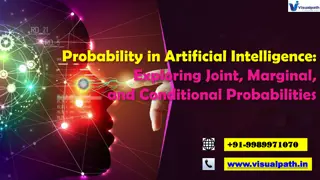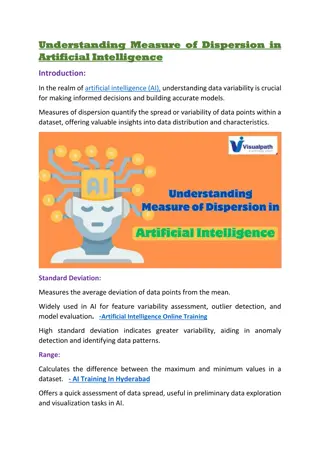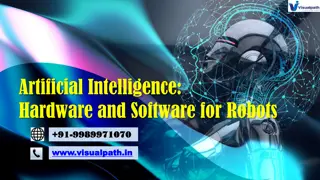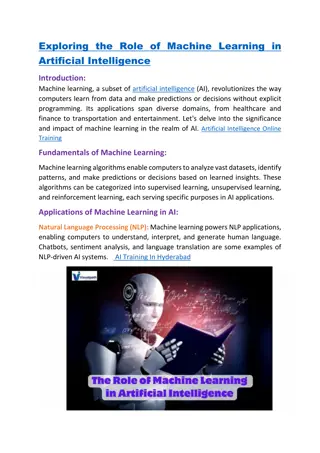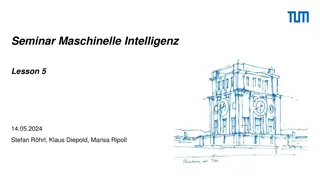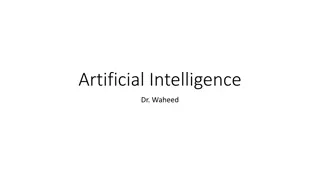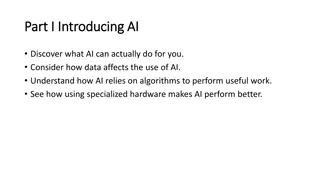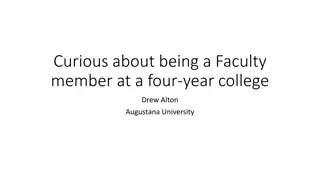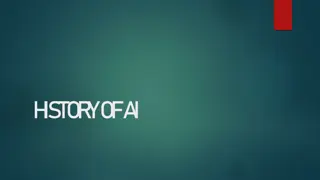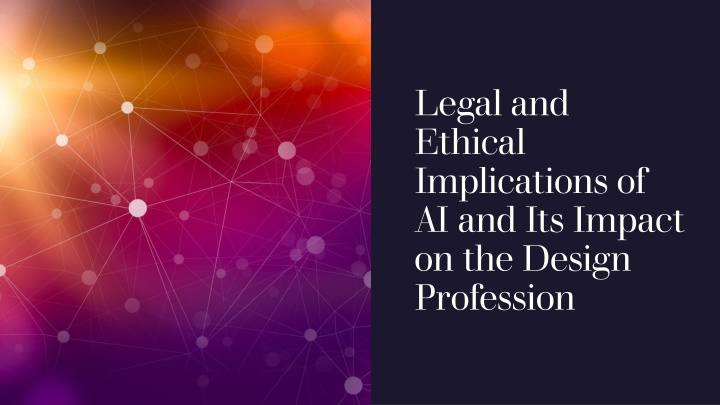
Legal and Ethical Implications of AI for Design Professionals
Explore the impact of Artificial Intelligence (AI) on the design profession, focusing on the legal and ethical implications. Learn about AI techniques, its intelligence levels, benefits, risks, and the aim of implementing AI in design. Discover how to protect yourself legally and ethically in the evolving landscape of AI technology.
Download Presentation

Please find below an Image/Link to download the presentation.
The content on the website is provided AS IS for your information and personal use only. It may not be sold, licensed, or shared on other websites without obtaining consent from the author. If you encounter any issues during the download, it is possible that the publisher has removed the file from their server.
You are allowed to download the files provided on this website for personal or commercial use, subject to the condition that they are used lawfully. All files are the property of their respective owners.
The content on the website is provided AS IS for your information and personal use only. It may not be sold, licensed, or shared on other websites without obtaining consent from the author.
E N D
Presentation Transcript
Legal and Ethical Implications of AI and Its Impact on the Design Profession
Agenda What is Artificial Intelligence The Aim of Artificial Intelligence Uses & Benefits of Artificial Intelligence Risks of Artificial Intelligence Law & Ethics Don t Let the Who Be You: Protect Yourself
Artificial Intelligence (AI)
Artificial Intelligence Techniques Modern method Classical methods Machine learning Knowledge based systems Supervised learning Expert systems Unsupervised learning Fuzzy logic Big data Artificial neural networks Detects similarities and patterns in available data set and uses these to interpret future data Evolutionary algorithms Deep learning (subset of Machine Learning) Genetic algorithms Multi-layered neural network
Is AI Intelligent? Hype, Puffery, Conflation, Misunderstanding & Misinformation Artificial intelligence Strong/General Artificial General Intelligence Imitate the mental and heuristic (common sense) processes that humans used when solving a problem. Explainable Artificial Intelligence (XAI) Super AI Weak/Narrow Computational software that successfully performs certain task but without involving heuristic (common sense) processes
The Aim of Artificial Intelligence The aim of AI is to perform human specific mental tasks and activities, quickly, effectively, accurately and efficiently by computers. Differs from traditional software in that the outputs are processed with incomplete and uncertain data. Creates semantic ( branch of linguistics and logic concerned with meaning ) relationships between data, inferences for the past and predictions for the future can be made. Y ksel
Risks With Artificial Intelligence
Law & Ethics Can design professional rely upon information provided by others? Can design professional rely upon AI software? AI is rapidly developing technology Paucity of legal precedent Lack of practice standards and guidelines As required under MCL 339.2008, the architect and/or engineer s seal certifies that the design professional is the person in responsible charge and has prepared the plan, plat, drawing, map, title sheet of specifications, addendum, bulletin, report, and/or index sheet, was prepared by them or under their direct supervision, and that the documents met applicable professional standards. MCL 388.851 architect/engineer prepare plans and supervise construction of schools
Standard of Care The law requires the exercise of ordinary skill and care common to the profession. A breach of the standard of care or practice, professional negligence and malpractice are the same. They mean the failure to do something that a [name profession] of ordinary learning, judgment and skill in [this community or a similar one / [name particular specialty] ] would do, or the doing of something that such a [name profession] would not do, under the same or similar circumstances as in this case. The standard does not differ from that of a lawyer or physician. When either possesses the requisite skill and knowledge, and in the exercise thereof has used his best judgment, he has done all that the law requires. The law does notimply a warranty or the guaranty of the perfection of his/her plans. The result may show a mistake or defect in them, although he may have exercised the reasonable skill required. Plans, now considered safe, experience and advanced knowledge of the science may hereafter show to be unsafe. The law requires only the exercise of ordinary skill and care, in the light of present knowledge. Chapel v. Clark, 117 Mich 638, 76 N.W. 62 (1898) It is for you to decide, based upon the evidence, what the [name profession / name particular specialty] of ordinary learning, judgment and skill would do or would not do under the same or similar circumstances. M Civ JI 30.01
Quality Assurance/Quality Control Trained on the underlying principles of architecture and engineering Trained on operation of software Understanding of software s underlying principles, parameters and methodology Understand the technology and its limits Knowledge of assumptions and parameters that have been set by design team Personally imputed the data or data was imputed under direct supervision Followed protocol Human review of data Can examine results produced by the program and assess their accuracy. Results are not the product of AI for which the analyst does not have responsibility. People v. H.K., 69 Misc. 3d 774 (N.Y. 2020); People v. Wakefield, 195 N.E.3d 19 (2022)
Thank you Thomas F. Waggoner Straub, Seaman & Allen, P.C. (269) 982-7715 twaggoner@lawssa.com http://lawssa.com

